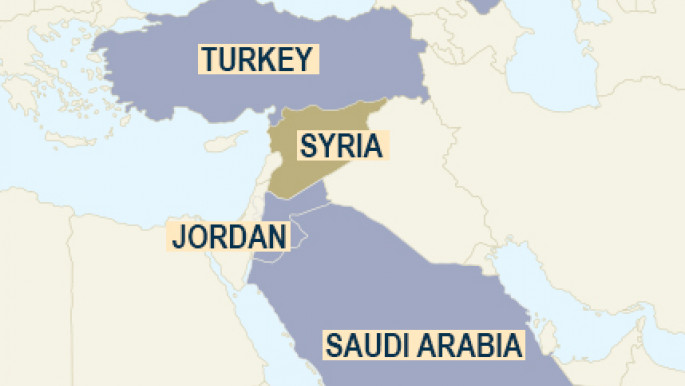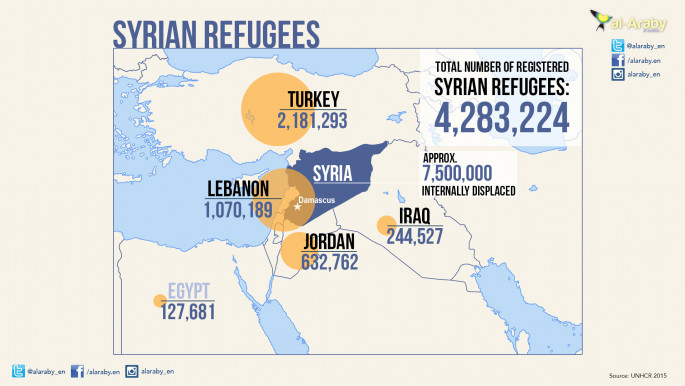Jordan's balancing act in Syria
With Russia and Jordan agreeing to coordinate their military operations over Syria, analysts are divided over the significance, and whether the move marks an U-turn by Amman.
5 min read
Russian Foreign Minister Sergei Lavrov (R) met with his Jordan counterpart Nasser Judeh Friday [AFP]
When Russia declared it was coordinating militarily with the kingdom of Jordan on Syria, many Syria experts were taken by surprise.
For one thing, this was a stark contradiction with previous policies pursued by the Hashemite Kingdom, which has supported Syrian armed groups fighting the regime in Damascus, particularly in southern Syria.
The announcement was made after a Friday meeting in Vienna between Jordanian Foreign Minister Nasser Judeh and Russian Foreign Minister Sergei Lavrov.
Lavrov said Russia and Jordan had agreed to create a coordination centre in Amman, which would be used by the two countries to share information on the counter-terrorism operations.
"Under an agreement between His Majesty King Abdullah II and Russia's President Vladimir Putin, the militaries of the two countries have agreed to coordinate their actions, including military aircraft missions over the Syrian territory," Lavrov said.
His Jordanian counterpart Nasser Judeh said the centre would serve as an "efficient communication tool for the militaries of the two nations".
Later, Mohammed al-Momani, official spokesperson for the Jordanian government, said the purpose of the cooperation is to secure the kingdom's borders with its northern neighbour.
Momani stressed his country remained part of the US-led international coalition against the Islamic State group (IS, formerly ISIS).
But Jordan has been struggling to secure its 400-km border with Syria, which the regime forces have largely evacuated.
Dozens of people have been arrested trying to illegally cross the border in both directions.
Jordan hosts more than 1.5 million Syrians, more than half of whom refugees.
Syrian rebels: Amman-Moscow cooperation is 'odd'
On Thursday, Russia reportedly carried out strikes in southern Syria's Daraa province for the first time in an apparent expansion of its aerial campaign.
The area targeted is controlled by an array of opposition groups including moderate groups such as the Free Syrian Army (FSA) and Islamist rebels and the al-Qaeda affiliate the Nusra Front.
The southern province, which borders Jordan, is largely under opposition control, with the provincial capital divided between regime and rebel forces.
Given Jordan's links to rebel groups there and the new overt coordination with Russia, it is possible the kingdom has given Moscow its consent to operate in what has practically been its "backyard" for some years now.
At least, this much has been hinted at by Syrian rebels operating in the area. A source in one of the southern branches of the Free Syrian Army (FSA) told al-Araby al-Jadeed's Arabic service the cooperation was "odd," at a time when Russian warplanes are bombing FSA positions.
He said: "The Southern Front have been aware that the Jordanian authorities are in contact with Russia and possibly the Assad regime to coordinate some issues. But the pollicisation of these contracts may signal the start of a new phase, which could have negative implications" for the Southern Front.
The source said this should be seen in the context of Jordan's disruption of the Jordan-based Military Operations Command (MOC), pulling the brakes on FSA military operations in southern Syria, as he claimed.
"There is a clear [Jordanian] red line that the rebel factions are not allowed to cross and capture the city of Daraa from the Syrian regime," the source added.
Jordan's 'positive silence'
Despite key differences between Jordan and Russia over targeting the moderate Syrian opposition, analysts say Amman could provide information on other terrorist and jihadist groups in Syria for Russia to strike.
Jordan itself has carried out strikes against such groups in Syria as part of the anti-IS coalition. Thousands of Jordanians are also thought to be fighting in the ranks of jihadist groups in Iraq and Syria.
The United States did not yet object to Russian-Jordanian coordination. Also recall that Jordan did not issue any official objections to Russian intervention in Syria, which some in Amman have described as a "positive silence."
In truth, Russian-Jordanian relations have been growing steadily over the past years. Areas of cooperation include trade, and nuclear energy, with Russia building a nuclear reactor in Jordan, and agriculture and tourism.
The two countries also collaborate on defence projects through the Jadara Equipment & Defence System Company.
Jadara is a joint venture between King Abdullah II Design & Development Bureau (KADDB) and The Jordanian Specialized Company for Electronic Services (JSCES). The company develops and produces portable, short-range weapons under the name of RPG-32 "Nasahshab".
Jordan is also set to acquire fighter jets from Russia through the same joint venture.
The international coalition
Political analysts are in agreement that Jordanian-Russian coordination does not signal a Jordanian turn away from its close ally the United States.
In truth, they agree the coordination could enjoy US consent, as part of US-Russian coordination in Syria.
Retired Maj. Gen. Qassem Saleh told al-Araby al-Jadeed: "Jordanian-Russian cooperation is not surprising even as international coalition jets continue to stage their sorties to bomb targets in Syria out of bases in Jordan."
He added: "Coordination is necessary with the Russian air force operating over Syria to avoid incidents and protect Jordanian borders from Russian operations in the southern area" in Syria.
Saleh believes coordination with Russia also achieves political gains for Jordan, and secures its seat at the table during any negotiations over Syria's future, although Jordan has not been invited to attend the newest round of talks in Vienna.
However, Bassam al-Manasir, head of the Foreign Affairs Committee in Jordan's parliament, had a different opinion.
Speaking to al-Araby al-Jadeed, he called on his government to end both its role in the US-led international coalition and its collaboration with Russia.
"The safest route for Jordan is to maintain its position calling for a political solution in Syria, and keeping its contacts with the Syrian opposition without burning bridges with the Syrian regime," Manasir added.
For one thing, this was a stark contradiction with previous policies pursued by the Hashemite Kingdom, which has supported Syrian armed groups fighting the regime in Damascus, particularly in southern Syria.
The announcement was made after a Friday meeting in Vienna between Jordanian Foreign Minister Nasser Judeh and Russian Foreign Minister Sergei Lavrov.
Lavrov said Russia and Jordan had agreed to create a coordination centre in Amman, which would be used by the two countries to share information on the counter-terrorism operations.
"Under an agreement between His Majesty King Abdullah II and Russia's President Vladimir Putin, the militaries of the two countries have agreed to coordinate their actions, including military aircraft missions over the Syrian territory," Lavrov said.
His Jordanian counterpart Nasser Judeh said the centre would serve as an "efficient communication tool for the militaries of the two nations".
 |
|
Later, Mohammed al-Momani, official spokesperson for the Jordanian government, said the purpose of the cooperation is to secure the kingdom's borders with its northern neighbour.
Momani stressed his country remained part of the US-led international coalition against the Islamic State group (IS, formerly ISIS).
But Jordan has been struggling to secure its 400-km border with Syria, which the regime forces have largely evacuated.
Dozens of people have been arrested trying to illegally cross the border in both directions.
Jordan hosts more than 1.5 million Syrians, more than half of whom refugees.
Syrian rebels: Amman-Moscow cooperation is 'odd'
On Thursday, Russia reportedly carried out strikes in southern Syria's Daraa province for the first time in an apparent expansion of its aerial campaign.
The area targeted is controlled by an array of opposition groups including moderate groups such as the Free Syrian Army (FSA) and Islamist rebels and the al-Qaeda affiliate the Nusra Front.
The southern province, which borders Jordan, is largely under opposition control, with the provincial capital divided between regime and rebel forces.
Given Jordan's links to rebel groups there and the new overt coordination with Russia, it is possible the kingdom has given Moscow its consent to operate in what has practically been its "backyard" for some years now.
At least, this much has been hinted at by Syrian rebels operating in the area. A source in one of the southern branches of the Free Syrian Army (FSA) told al-Araby al-Jadeed's Arabic service the cooperation was "odd," at a time when Russian warplanes are bombing FSA positions.
He said: "The Southern Front have been aware that the Jordanian authorities are in contact with Russia and possibly the Assad regime to coordinate some issues. But the pollicisation of these contracts may signal the start of a new phase, which could have negative implications" for the Southern Front.
The source said this should be seen in the context of Jordan's disruption of the Jordan-based Military Operations Command (MOC), pulling the brakes on FSA military operations in southern Syria, as he claimed.
"There is a clear [Jordanian] red line that the rebel factions are not allowed to cross and capture the city of Daraa from the Syrian regime," the source added.
 |
Jordan's 'positive silence'
Despite key differences between Jordan and Russia over targeting the moderate Syrian opposition, analysts say Amman could provide information on other terrorist and jihadist groups in Syria for Russia to strike.
Jordan itself has carried out strikes against such groups in Syria as part of the anti-IS coalition. Thousands of Jordanians are also thought to be fighting in the ranks of jihadist groups in Iraq and Syria.
The United States did not yet object to Russian-Jordanian coordination. Also recall that Jordan did not issue any official objections to Russian intervention in Syria, which some in Amman have described as a "positive silence."
 |
|
In truth, Russian-Jordanian relations have been growing steadily over the past years. Areas of cooperation include trade, and nuclear energy, with Russia building a nuclear reactor in Jordan, and agriculture and tourism.
The two countries also collaborate on defence projects through the Jadara Equipment & Defence System Company.
Jadara is a joint venture between King Abdullah II Design & Development Bureau (KADDB) and The Jordanian Specialized Company for Electronic Services (JSCES). The company develops and produces portable, short-range weapons under the name of RPG-32 "Nasahshab".
Jordan is also set to acquire fighter jets from Russia through the same joint venture.
The international coalition
Political analysts are in agreement that Jordanian-Russian coordination does not signal a Jordanian turn away from its close ally the United States.
In truth, they agree the coordination could enjoy US consent, as part of US-Russian coordination in Syria.
Retired Maj. Gen. Qassem Saleh told al-Araby al-Jadeed: "Jordanian-Russian cooperation is not surprising even as international coalition jets continue to stage their sorties to bomb targets in Syria out of bases in Jordan."
| "The safest route for Jordan is to keep contacts with the opposition without burning bridges with the regime" -Bassam al-Manasir. |
He added: "Coordination is necessary with the Russian air force operating over Syria to avoid incidents and protect Jordanian borders from Russian operations in the southern area" in Syria.
Saleh believes coordination with Russia also achieves political gains for Jordan, and secures its seat at the table during any negotiations over Syria's future, although Jordan has not been invited to attend the newest round of talks in Vienna.
However, Bassam al-Manasir, head of the Foreign Affairs Committee in Jordan's parliament, had a different opinion.
Speaking to al-Araby al-Jadeed, he called on his government to end both its role in the US-led international coalition and its collaboration with Russia.
"The safest route for Jordan is to maintain its position calling for a political solution in Syria, and keeping its contacts with the Syrian opposition without burning bridges with the Syrian regime," Manasir added.





 Follow the Middle East's top stories in English at The New Arab on Google News
Follow the Middle East's top stories in English at The New Arab on Google News


